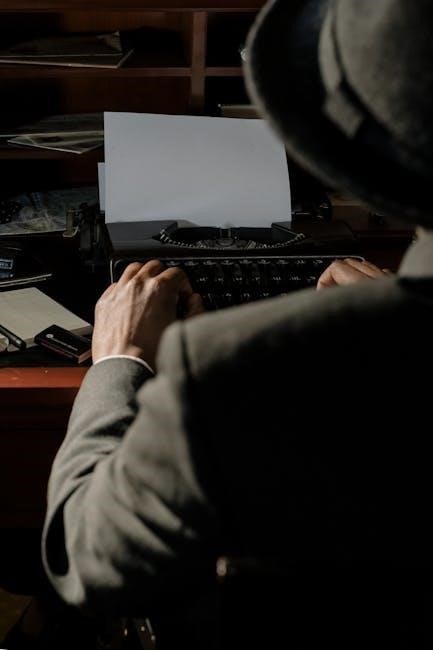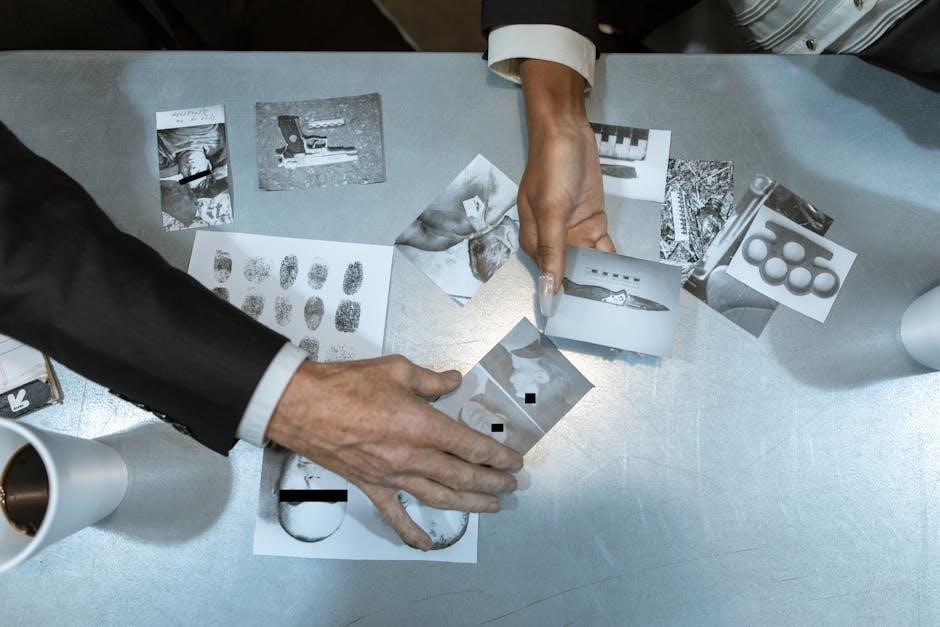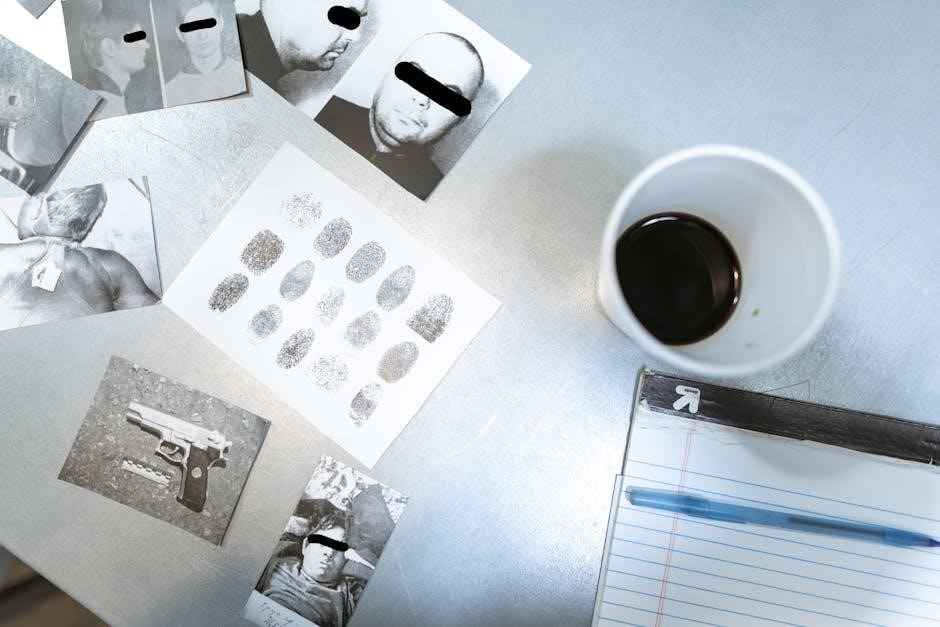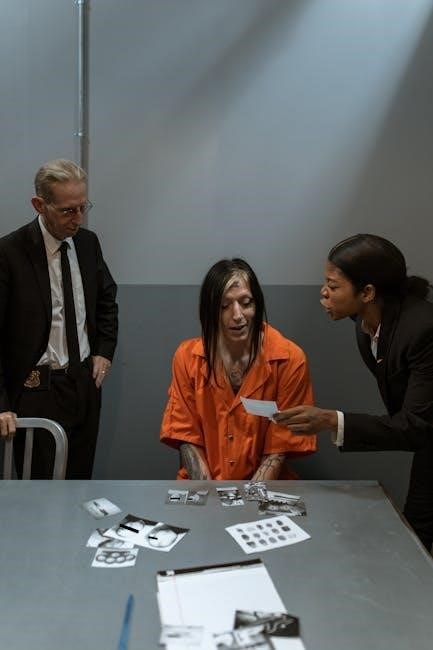The Junior Detective Badge introduces young adventurers to the thrilling world of investigation. Through fun activities, they learn observation, code-breaking, and safety, earning their detective credentials with pride.
1.1. Purpose of the Junior Detective Badge
The Junior Detective Badge is designed to empower young girls with essential investigative skills, fostering curiosity and critical thinking; Participants learn to observe details, crack codes, and solve mysteries, preparing them for real-world problem-solving. The badge encourages teamwork, creativity, and logical reasoning while introducing the fundamentals of detective work. By completing challenges like fingerprinting and clue analysis, girls gain confidence and a sense of accomplishment. The program aims to inspire future leaders by blending fun with education, providing a strong foundation in STEM and life skills. Earning the badge is a celebration of their growth and newfound detective expertise.

1.2. Overview of the Program Structure
The Junior Detective Badge program is structured to engage participants in interactive and educational activities. It begins with an introduction to the detective academy, where girls learn to observe carefully, think critically, and make safe choices. The program is divided into core requirements, such as practicing observation, communicating in code, and solving mysteries. Additional activities include detective science experiments and handwriting analysis. The structure ensures a balanced mix of individual and team-based challenges, fostering collaboration and problem-solving skills. By completing these activities, girls progress through the program, ultimately earning their Junior Detective Badge and gaining essential life skills.
1.3. Importance of Earning the Badge
Earning the Junior Detective Badge is a significant achievement that fosters critical thinking, creativity, and problem-solving skills. It encourages young participants to develop a keen sense of observation and effective communication. The badge serves as a recognition of their dedication and hard work, building confidence and a sense of accomplishment. It also promotes teamwork and collaboration, essential for future endeavors. By earning the badge, girls gain a deeper understanding of detective work and its practical applications, making it a valuable experience that enriches their personal and educational growth. The badge is a proud symbol of their commitment to learning and skill development.

Eligibility Criteria for the Junior Detective Badge
To qualify, participants must meet specific requirements, including age restrictions, educational prerequisites, and formal approval. Detailed criteria ensure the program is accessible and suitable for young detectives.
2.1. Age Requirements
The Junior Detective Badge program is designed for young enthusiasts aged 8 to 14. This range ensures participants have the cognitive and motor skills needed for detective work. Children under 8 may lack the necessary attention span and dexterity, while those over 14 might find the activities too simplistic. The program aims to foster growth in observation, problem-solving, and teamwork among preteens. Adult supervision is recommended for younger participants to enhance learning and safety during activities. This age range balances fun and educational value, making it ideal for developing junior detectives.
2.2. Educational Background
Earning the Junior Detective Badge requires basic literacy and problem-solving skills, typically acquired through elementary education. Participants should have completed at least third grade to fully engage with the program’s activities. While formal education isn’t strictly mandated, familiarity with reading, writing, and simple math is essential. Homeschooled children or those in alternative learning environments are also eligible if they demonstrate equivalent knowledge levels. The program is designed to complement educational growth by fostering critical thinking and creativity, making it accessible to a wide range of young learners.
2.3. Approval Process
To earn the Junior Detective Badge, participants must complete an official application form and submit it for review. The process typically involves verifying completed requirements through activity logs or project submissions. A review panel or program administrator will assess the work to ensure all criteria are met. In some cases, a brief interview or presentation may be required to demonstrate understanding. The approval process is designed to be fair and transparent, ensuring every participant has an equal opportunity to succeed. Once approved, the badge is awarded, marking a significant achievement in their detective training journey.

Core Requirements for the Junior Detective Badge
The core requirements include mastering observation, communication, and problem-solving skills. Participants must practice deduction, decode messages, and complete hands-on challenges to demonstrate their detective abilities effectively.
3.1. Practice the Power of Observation
Observation is a critical skill for junior detectives. Participants must practice identifying details in images, scenes, and scenarios. Activities include analyzing clues, recognizing patterns, and describing environments accurately. Trainees are encouraged to use magnifying glasses and journals to record findings. These exercises enhance attention to detail and analytical thinking, essential for solving mysteries. Regular practice helps develop a keen eye for noticing what others might miss, a vital trait for aspiring detectives.
3.2. Communicate in Code
Mastering code communication is a fun and essential skill for junior detectives. Trainees learn basic cryptography techniques, such as substitution ciphers, Caesar ciphers, and simple symbol codes. Activities involve creating and decoding secret messages, using tools like cipher wheels or online code generators. This skill enhances problem-solving abilities and introduces the concept of secure communication. By practicing code creation and deciphering, young detectives develop creativity and logical thinking, which are vital for solving mysteries and sharing clues discreetly. Coding exercises are both entertaining and educational, making them a highlight of the program.
3.3. Fingerprinting for Fun
Fingerprinting is a fascinating skill that introduces young detectives to forensic science. Trainees learn how to create and analyze fingerprints using safe materials like ink pads or digital tools. Activities include lifting prints from surfaces, comparing patterns, and understanding unique traits. This exercise teaches the importance of detail and identification methods used in real detective work. Fingerprinting sessions are designed to be engaging and educational, helping juniors develop observation skills while exploring the science behind identity verification. It’s a hands-on way to connect with the exciting world of detective investigations.
3.4. Solving a Real Mystery
Solving a real mystery is a thrilling part of earning the Junior Detective Badge. Trainees are presented with a realistic, age-appropriate scenario where they must gather clues, analyze evidence, and deduce the solution. This activity enhances critical thinking, problem-solving, and teamwork. By applying skills like observation, deduction, and code-breaking, young detectives unravel the mystery step by step. The experience builds confidence and provides a sense of accomplishment, preparing them for more complex challenges in detective work. It’s an engaging way to apply knowledge and creativity in a fun, real-world context.

Skills Development for Junior Detectives
This section focuses on enhancing essential detective skills like analytical thinking, observation, and problem-solving. Trainees learn to decode messages, analyze handwriting, and strategize clue hunts effectively.
4.1. Code-Breaking Techniques
Code-breaking is a fundamental skill for junior detectives, teaching them to decipher hidden messages and solve puzzles. Trainees learn basic cryptography, including Caesar ciphers, substitution codes, and pattern recognition. They practice encrypting and decrypting messages, enhancing their analytical thinking. Activities include identifying clues in coded texts and solving simple cryptograms. This skill sharpens their ability to uncover hidden information, essential for mystery-solving. By mastering code-breaking, juniors develop patience, attention to detail, and logical reasoning, all vital for real-world detective work and problem-solving scenarios.
4.2. Handwriting Analysis
Handwriting analysis introduces junior detectives to the basics of understanding personality traits and behaviors through handwriting. Trainees learn to identify key elements like letter formation, spacing, and slant. They practice comparing samples to detect inconsistencies, useful in solving mysteries. This skill enhances observational abilities and attention to detail, essential for detective work. By studying handwriting, juniors develop a deeper understanding of human behavior, aiding in character assessment and clue interpretation. This activity fosters critical thinking and analytical skills, preparing them for more complex investigative tasks in the future.
4.3. Clue Hunting Strategies
Clue hunting strategies teach junior detectives how to systematically search for and identify hidden or subtle evidence. Trainees learn techniques like grid searches, pattern recognition, and deductive reasoning to locate clues in various environments. They practice using tools such as magnifying glasses, flashlights, and tweezers to examine details. This skill enhances their ability to think critically and solve puzzles. By mastering clue hunting, juniors develop patience, persistence, and the ability to piece together seemingly unrelated pieces of information. These strategies are essential for solving mysteries and advancing their detective skills effectively.

Activities and Challenges
Engage in detective-themed science experiments, analyze mystery stories, and participate in team collaboration exercises to sharpen investigative skills and problem-solving abilities in a fun, interactive environment.
5.1. Detective Science Experiments
Junior detectives can explore fascinating science experiments tailored to investigative themes. Activities include creating invisible ink using household items, analyzing fingerprints with ink pads, and conducting simple chemical reactions to reveal hidden clues. These experiments foster critical thinking and observation skills, essential for solving mysteries. Participants learn to collect evidence, test hypotheses, and draw conclusions, all while having fun. The experiments are designed to be safe, educational, and engaging, helping young detectives develop a scientific mindset and hands-on experience in forensic techniques. These activities align with the Junior Detective Badge requirements, making learning both exciting and purposeful.
5.2. Mystery Story Analysis
Junior detectives engage in mystery story analysis to sharpen their investigative skills. Participants read selected mystery stories, identifying clues, suspects, and motives. They practice piecing together evidence to solve the case before the story’s end. Activities include creating mind maps of plot twists and crafting suspect lists. This exercise enhances critical thinking, attention to detail, and storytelling comprehension. Young detectives also learn to present their theories and solutions, fostering confidence in their analytical abilities. These exercises are designed to be both educational and entertaining, aligning with the Junior Detective Badge requirements to build a strong foundation in investigative thinking and problem-solving strategies.
5.3. Team Collaboration Exercises
Team collaboration exercises are essential for junior detectives, fostering teamwork and communication. Participants work in groups to solve mysteries, sharing observations and ideas. Activities include role-playing as detectives, joint problem-solving, and pooled clue analysis. These exercises teach young investigators to rely on each other’s strengths, building trust and cooperation. Collaborative challenges simulate real-world detective scenarios, preparing juniors for teamwork in future investigations. By working together, they learn to combine skills, diverse perspectives, and creative thinking to achieve common goals, enhancing their ability to tackle complex cases effectively and efficiently as a cohesive unit.

Materials and Resources Needed
This section outlines the essential tools and resources required for the Junior Detective Badge, including activity kits and online guides to aid young investigators successfully.
6.1. Essential Tools for Detectives
To embark on detective adventures, juniors need a magnifying glass for close observations, a notebook and pencil for recording clues, and a flashlight for examining dark spaces. Gloves are essential for handling evidence without contamination. Fingerprinting kits, including ink pads and fingerprint cards, help in identifying suspects. A simple camera or smartphone can document findings, while evidence bags and tags ensure clues are preserved. A compass aids in mapping locations, and basic office supplies like scissors and tape are handy for crafting investigative tools. These items form the foundation of a young detective’s toolkit, fostering hands-on learning and creative problem-solving skills.
6.2. Recommended Activity Kits
Enhance detective training with activity kits designed for young sleuths. Forensic science kits include DNA extraction tools and crime scene investigation materials. Code-cracking kits provide ciphers, invisible ink, and decoding wheels to sharpen encryption skills. Mystery-solving kits offer scenario cards, puzzles, and riddles to test problem-solving abilities. Evidence collection kits, complete with mini magnifying glasses and fingerprinting supplies, encourage hands-on investigation. These kits align with badge requirements, fostering creativity and critical thinking while making detective work fun and engaging for juniors.
6.3. Online Guides and Worksheets
Supplement learning with online guides and worksheets tailored for junior detectives. Interactive exercises cover observation techniques, code-breaking, and clue analysis. Printable worksheets include puzzles, quizzes, and scenario-based challenges to enhance problem-solving skills. Video tutorials and webinars offer step-by-step instructions for complex tasks. These resources align with badge requirements, providing a structured path for completion. Accessible on mobile devices, they allow juniors to learn anytime, anywhere. The materials are designed to be engaging, fostering a deeper understanding of detective work while keeping the process fun and educational.

Assessment and Completion
The badge assessment involves evaluating detective skills, submission of completed tasks, and a final project review. Upon approval, juniors receive a personalized certificate of achievement.
7.1. Badge Evaluation Process

The Junior Detective Badge evaluation process ensures participants demonstrate mastery of detective skills. Trained reviewers assess completed tasks, observational logs, and problem-solving exercises. The evaluation focuses on accuracy, creativity, and adherence to detective principles. Evidence of skill progression and understanding of investigative techniques is required. A review panel verifies submissions, ensuring all criteria are met before awarding the badge. This rigorous process guarantees that juniors have truly earned their detective status, showcasing their ability to solve mysteries and think critically. The evaluation is fair, thorough, and designed to highlight each participant’s unique strengths and achievements.
7.2. Submission Requirements
To qualify for the Junior Detective Badge, participants must submit a completed portfolio. This includes a log of observations, solved mysteries, and coded messages. All activities must be documented with photos, notes, or videos. A final reflective report outlining lessons learned and challenges faced is also required. Submissions must be neatly organized and meet specified formatting guidelines. Materials can be submitted online or via mail, depending on program instructions. Ensure all requirements are met accurately to qualify for badge approval. Late or incomplete submissions may not be accepted, so attention to detail is crucial for success.
7.3. Certificate of Completion
Upon successfully meeting all badge requirements, participants receive a Certificate of Completion. This official document acknowledges their dedication and mastery of detective skills. The certificate is uniquely designed, featuring the Junior Detective Badge emblem and the participant’s name. It is awarded after the submission has been reviewed and approved. Participants can display this certificate proudly as proof of their achievement. A digital version is also provided for sharing online. Keep the certificate safe, as it serves as lasting recognition of your hard work and detective expertise.

Additional Resources and Support
Access official guides, expert tips, and community forums to aid your journey. These resources provide valuable insights and support to help you excel in earning the badge.
8.1. Official Junior Detective Badge PDF Guide
The Official Junior Detective Badge PDF Guide is an essential resource for participants. It outlines all requirements, activities, and tips needed to earn the badge. Available for download, the guide provides a comprehensive overview of the program, including step-by-step instructions for each task. It also offers helpful visuals, worksheets, and expert advice to ensure success. The PDF is designed to be user-friendly, making it easy for young detectives to follow and complete their journey. By utilizing this guide, participants can stay organized and focused on achieving their badge.
8.2. Expert Tips for Success
To excel in earning the Junior Detective Badge, experts recommend developing strong observation and critical thinking skills. Practice active listening and attention to detail in daily activities. Use deduction to connect clues logically and creatively. Stay organized by documenting findings and ideas systematically. Collaborate with peers to share insights and solve challenges. Embrace curiosity and persistence, as mysteries often require patience. Lastly, have fun while learning, as enthusiasm fuels creativity and problem-solving. By following these tips, young detectives can confidently navigate the program and achieve their badge with pride.
8.3. Community and Forum Support
Engaging with the Junior Detective Badge community and forums provides invaluable support for young participants. These platforms offer tips, advice, and shared experiences from seasoned detectives and peers. Members can discuss challenges, exchange ideas, and learn from others’ successes. Many communities also provide access to additional resources and guides tailored to the badge requirements. Participants can ask questions, receive feedback, and stay motivated through encouragement from fellow enthusiasts. Joining these groups fosters a sense of belonging and helps young detectives stay on track. Approval may be required to join, ensuring a safe and relevant environment for all members.
Earning the Junior Detective Badge is a rewarding achievement that fosters critical thinking and problem-solving skills. Use this accomplishment to explore further detective opportunities and adventures ahead.
9.1. Celebrating Achievement
Congratulations on completing the Junior Detective Badge requirements! Celebrate this accomplishment by sharing your success with friends, family, or a mentor. Display your badge proudly to showcase your dedication and skills. Reflect on the challenges you overcame and the fun you had while solving mysteries and learning detective techniques. This achievement is a testament to your curiosity and perseverance. Use this momentum to continue exploring detective work or take on new adventures. Celebrating your success is a great way to inspire others and highlight the value of teamwork and critical thinking.
9.2. Advancing to Higher Levels
Earning the Junior Detective Badge is just the beginning! Use this achievement as a stepping stone to explore more advanced detective programs. Consider enrolling in intermediate or advanced detective courses to deepen your skills in surveillance, forensic analysis, and interrogation techniques. Many organizations offer higher-level badges or certifications that build on the foundational knowledge gained. Stay curious, seek mentorship, and apply your skills in real-world scenarios to continue growing as a detective. The Junior Detective Badge PDF guide often includes resources for further learning, helping you transition smoothly to higher levels of detective training and expertise.
